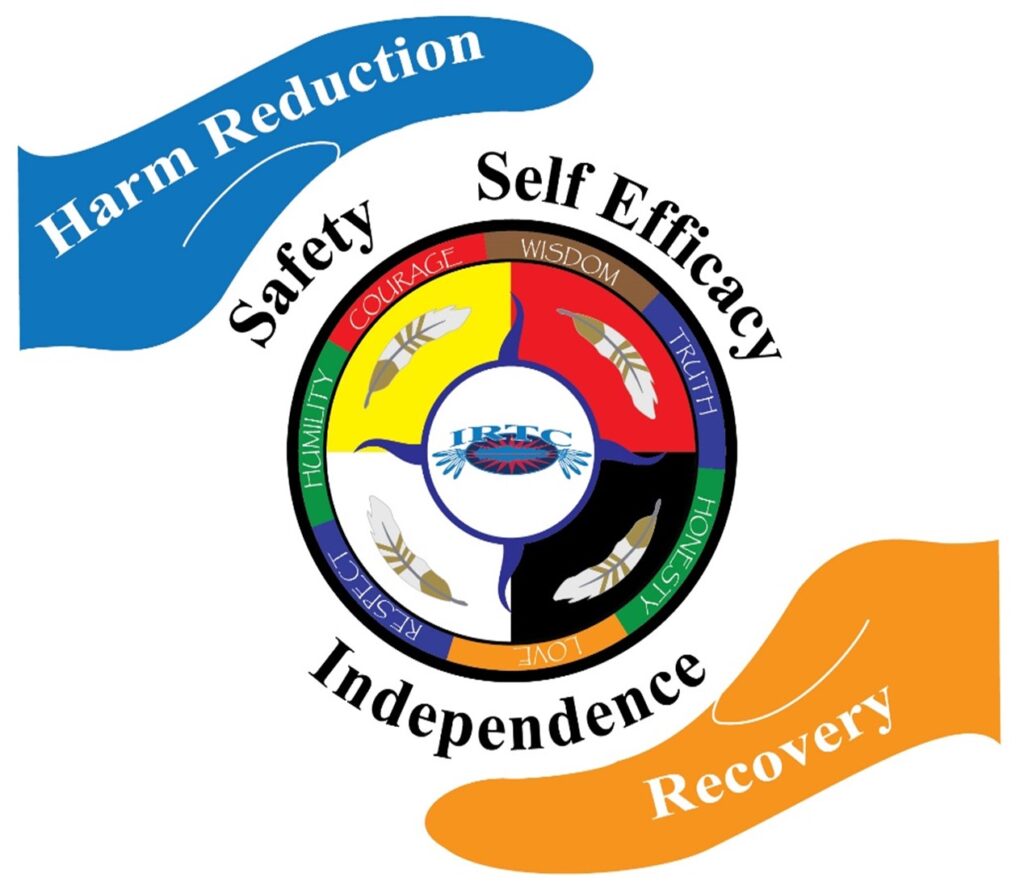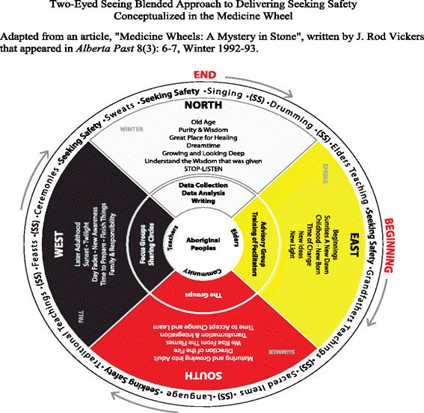Acknowledgment
This position statement is adapted from Indigenous Harm Reduction policy brief (March 19, 2019), Position Statement on Harm Reduction (January 2016) Province of Manitoba and scientific paper by Marsh et al (2015), Harm Reduction Journal.
Program Description
Interlake Reserves Tribal Council’s (IRTC) Harm Reduction is a federally funded program to support on-reserve harm reduction activities in six member communities and two independent communities in the Interlake Region. Manitoba Harm Reduction Network (MHRN) (Eriksdale – Ashern) and Interlake Eastern Regional Health Authority (IERHA) supports this program in a non-jurisdictional approach and facilitates strengthening IRTC’s, MHRN’s and IERHA’s collaboration and partnership working in supporting and addressing the needs of diverse groups in member and independent communities.

Harm Reduction program at IRTC aims to provide evidence – based support and advocation for culturally sensitive harm reduction approaches to the following six member communities and two independent communities.
IRTC member communities:
- Lake Manitoba First Nation
- Dauphin River First Nation
- Kinonjeoshtegon (Jackhead) First Nation
- Pinaymootang (Fairford) First Nation
- Little Saskatchewan First Nation
- Peguis First Nation
- Lake St. Martin First Nation
Independent Communities:
- Fisher River Cree Nation
The program supports above communities in enhancing harm reduction services and support systems through existing community health and social care programs by investing in community capacity building in an ASSETS BASED COMMUNITY DEVELOPMENT (ABCD) Model.
Indigenous Harm Reduction Purpose
Harm reduction refers to policies, programmes and practices that aim to minimise negative health, social and legal impacts associated with drug use, drug policies and drug laws. Harm reduction is grounded in justice and human rights – it focuses on positive change and on working with people without judgement, coercion, discrimination, or requiring that they stop using drugs as a precondition of support. (Harm Reduction International 2021).
Harm Reduction is a perspective that focuses on reducing the adverse health, social, and economic consequences of psychoactive drug use, and its Principles can be equally applied to other stigmatized and/or criminalized practices and behaviours related to substance use and sex.
Harm reduction promotes health for the individual, and advocates for broader health and social policy change. It does not condone or condemn any behaviour. While the historical roots of harm reduction are in substance use, these principles are used in many different contexts. For example, seat belts reduce the harms of driving collisions, and sunscreens reduce the harms from sun exposure.
Mainstream harm reduction practices (Western treatment model – “Seeking Safety”), such as naloxone distribution and opioid substitution therapies, have been proven to save lives; however, they are narrowly focused on substance using behaviours and do not address the broader social and system-wide issues that contribute to and intersect with substance use for Indigenous peoples in the first place. For Indigenous communities,
Indigenous Harm Reduction = Reducing the Harms of Colonialism.
Indigenous peoples, communities, and cultures are strong. While the experiences of First Nations, Métis and Inuit in Canada are unique, they have all experienced hundreds of years of colonization, persecution and on-going structural violence that was intended to push them to the margins of society.
In the face of such oppression, however, with the guidance of Elders, ceremonies, and local Indigenous knowledges that have been passed down through generations, Indigenous peoples, languages, cultures, and traditions have not only survived, but they have also been revived, reclaimed, and revitalized. This can be no more important than now, amid Canada’s on-going opioid and overdose crisis, in which Indigenous peoples are over-represented.
As with many Indigenous groups around the world, Aboriginal communities in Canada face significant challenges with trauma and substance use. The complexity of symptoms that accompany intergenerational trauma and substance use disorders represents major challenges. There appears to be an underutilization of substance use and mental health services, substantial client dropout rates, and an increase in HIV infections in Aboriginal communities in Canada.
Therefore, IRTC Harm Reduction program adapts an evidence based blended (Indigenous healing practices and Western treatment model) approach – “Two Eyed Seeing” concept, recommended by – Marsh et.al (2015). Two-Eyed Seeing is a philosophical, theoretical, and/or methodological approach that recognizes the need for both Western and Indigenous ways of knowing in research, knowledge translation, and programme development.
Western Harm Reduction Principles | Indigenous Harm Reduction Principles |
| · Decolonizing. · Trauma informed. · Community-based and peer-led. · Distinctions – based and culturally safe. · Reflexive. · Indigenizing. Culturally grounded. · Strengths-based. · Holistic-Wholistic. · Inclusive. · Innovative – evidence based.
|

IRTC Harm Reduction Program aims to support communities and individuals in Two-Eyed Seeing blended approach, based on their level of readiness. In this process, Harm Reduction Program also acknowledged the challenges and barriers and advocates for accommodating and strengthening existing harm reduction practices for the well-being of individuals and communities.
Examples of IRTC Harm Reduction Program services and/or supports:
- Outreach, education, and awareness (wide range of topics).
- Opioid overdose prevention and Naloxone training and support community distribution sites.
- Needle distribution support, Meth and Crack pipes supply support.
- Safer sex supplies distribution.
- Address associated risks and stigma.
- Advocate for First Nation’s culturally sensitive practices.
Contacts:
- Lalith Nagella – Harm Reduction Coordinator | lalithnagella@irtc.ca
- Charmaine Delaronde – Health Director | charmainedelaronde@irtc.ca
Download: IRTC Harm Reduction Position Statement (1)
